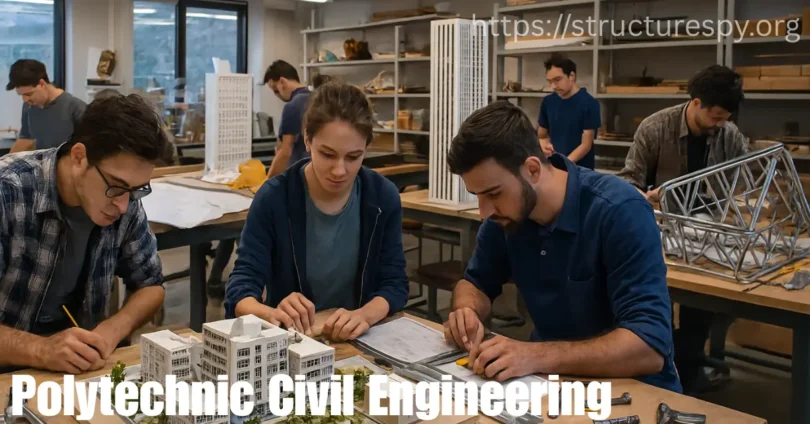Polytechnic Civil Engineering is a practical and career focused course that teaches students how to design, build and maintain structures like buildings, bridges and roads. This course provides hands on training, making it easier for students to understand real world construction projects.
By studying Polytechnic Civil Engineering, students can gain the skills needed for jobs in construction, surveying and project management, while preparing for a successful career in the engineering field.
History of Civil Engineering
The history of civil engineering goes back thousands of years when humans first started building shelters, roads and bridges. Ancient civilizations like Egypt, Mesopotamia and Rome built impressive structures such as the pyramids, aqueducts and roads, which still inspire engineers today.
Over time, civil engineering developed into a formal profession, and polytechnic education programs were created to train skilled engineers. Today, studying Polytechnic Civil Engineering allows students to learn both traditional building techniques and modern construction technology, connecting the past with the future.
Key Subjects in Polytechnic Civil Engineering
In Polytechnic Civil Engineering, students study various subjects that help them understand construction and design. These subjects provide both theory and practical knowledge for real-world projects.
- Construction Technology: Learn how to build structures safely and efficiently.
- Surveying: Understand how to measure land and prepare maps for construction.
- Concrete Technology: Study the properties of concrete and how to use it in buildings.
- Building Materials: Learn about different materials like bricks, steel, and wood.
- Structural Engineering: Understand how buildings, bridges and other structures stay strong.
- Hydraulics and Water Resources: Study the flow of water and its use in construction projects.
- Transportation Engineering: Learn how roads, railways, and airports are planned and built.
- Soil Mechanics: Understand the strength and behavior of soil for safe foundations.
- Project Management: Learn to plan, schedule and manage construction projects.
Studying these subjects in Polytechnic Civil Engineering prepares students with the skills needed to work on real construction projects and succeed in their careers.
Career Opportunities After Polytechnic Civil Engineering
After completing Polytechnic Civil Engineering, students can choose from many jobs in the construction and engineering fields. These careers allow them to use their practical skills and grow professionally.
- Site Engineer: Supervise construction work and ensure projects are built correctly.
- Project Manager: Plan and manage construction projects from start to finish.
- Draftsman: Create detailed drawings and blueprints for buildings and structures.
- Surveyor: Measure land and prepare maps for construction planning.
- Quality Control Engineer: Ensure materials and construction meet safety standards.
- Construction Consultant: Provide advice on building design and project execution.
- Structural Engineer: Focus on designing safe and strong structures.
- Civil Technician: Assist engineers with fieldwork and laboratory tests.
These careers in Polytechnic Civil Engineering offer good opportunities for growth, learning, and a stable professional future.
Skills Required for Civil Engineering Students
Students studying Polytechnic Civil Engineering need both technical and soft skills to succeed in their careers. These skills help them complete projects efficiently and work well with teams.
- Technical Skills: Knowledge of AutoCAD, blueprint reading, and surveying techniques.
- Mathematics and Science: Strong understanding of math and physics for design calculations.
- Problem Solving: Ability to find solutions to construction challenges.
- Communication Skills: Clear communication with team members, clients, and supervisors.
- Teamwork: Work effectively with engineers, technicians and laborers.
- Time Management: Complete projects and assignments on schedule.
- Practical Skills: Hands on experience in construction work and lab testing.
Developing these skills in Polytechnic Civil Engineering prepares students for real world challenges and increases their chances of a successful engineering career.
Advantages of Polytechnic in Civil Engineering
Studying Polytechnic Civil Engineering offers many benefits for students who want practical knowledge and a fast track to jobs in construction and engineering.
- Shorter Duration: Polytechnic courses are usually 2–3 years, faster than traditional degrees.
- Practical Learning: Focus on hands-on training and real-world construction projects.
- Cost Effective Education: Less expensive than long university programs.
- Job Readiness: Prepares students for immediate employment in engineering fields.
- Skill Development: Students gain both technical and soft skills needed for the workplace.
- Industry Exposure: Opportunities to work on live projects and internships.
These advantages make Polytechnic Civil Engineering a smart choice for students who want to quickly start their career and gain practical experience in construction and engineering.
Top Polytechnic Colleges for Civil Engineering
Choosing the right college is very important for students studying Polytechnic Civil Engineering. The best colleges provide quality education, practical training, and good job opportunities.
- Government Polytechnic Institutes: Known for affordable fees and recognized certifications.
- Private Polytechnic Colleges: Offer modern facilities and advanced technology training.
- Top International Colleges: Provide global exposure and better career opportunities.
- Admission Requirements: Most colleges require basic education in science and math.
- Campus Facilities: Labs, workshops, and libraries that help in practical learning.
- Internship Opportunities: Colleges that provide real world project experience.
Selecting a good college in Polytechnic Civil Engineering ensures quality education, skill development and better career growth in the engineering field.
Real Life Applications of Civil Engineering
Polytechnic Civil Engineering students learn skills that are used in many real-life construction and infrastructure projects. Understanding these applications helps students see the importance of their studies.
- Building Construction: Designing and constructing homes, offices, and schools.
- Bridges and Roads: Planning and building safe roads, highways, and bridges.
- Dams and Water Projects: Managing water supply and building dams for irrigation.
- Railways and Airports: Designing transportation systems for efficient travel.
- Urban Planning: Helping cities grow safely with proper infrastructure.
- Environmental Projects: Building eco friendly structures and sustainable solutions.
- Internships and Projects: Students gain experience by working on real construction sites.
Learning these applications in Polytechnic Civil Engineering gives students practical experience and prepares them to contribute to important infrastructure projects in the real world.
Future of Civil Engineering and Polytechnic Education
The future of Polytechnic Civil Engineering is bright, with new technologies and innovations changing how engineers design and build structures. Students who learn modern methods will have many opportunities in their careers.
- Emerging Technologies: Use of 3D printing, drones, and smart construction tools.
- Green Buildings: Designing eco friendly and sustainable structures.
- Smart Cities: Planning modern cities with advanced infrastructure.
- International Opportunities: Work on projects around the world with global demand.
- Continuous Learning: Importance of upgrading skills to stay competitive.
- Research and Innovation: Contributing to new construction methods and materials.
- Career Growth: More jobs in construction, infrastructure and project management.
Understanding the future of Polytechnic Civil Engineering motivates students to learn continuously and prepares them for exciting opportunities in the engineering world.
Common FAQs About Polytechnic Civil Engineering
Some faqs about Polytechnic Civil Engineering:
Can girls also pursue Polytechnic Civil Engineering?
Yes, both boys and girls can study Polytechnic Civil Engineering and work in construction and engineering projects.
Is prior experience in construction required?
No, students do not need prior experience polytechnic courses teach all necessary skills from the beginning.
Are online polytechnic courses available?
Yes, some institutions offer online courses with video lessons and virtual labs.
How much practical work is included in the course?
Students spend a lot of time in workshops, labs and construction sites to gain hands on experience.
Can polytechnic graduates start their own business?
Yes, many graduates start small construction or consulting businesses after completing the course.
Do polytechnic colleges provide placement assistance?
Many colleges have career cells that help students get internships and job placements after graduation.
Can a polytechnic graduate continue higher studies?
Yes, graduates can pursue bachelor’s degrees in civil engineering or related fields.
What is the average age to start this course?
Most students begin polytechnic courses after completing 10th grade, usually around 16–18 years old.
Are internships mandatory in polytechnic courses?
Yes, most colleges require internships to provide real world experience.
How does polytechnic help in learning modern construction software?
Students are trained in tools like AutoCAD, STAAD Pro and project management software to stay up to date with industry standards.
Conclusion
Pursuing a polytechnic civil engineering program provides a strong foundation for a practical and rewarding career in the construction and infrastructure industry. Students gain hands on experience, technical skills, and knowledge of modern engineering practices, preparing them for various roles in project management, design and site supervision.
Choosing Polytechnic Civil Engineering ensures a balance between theoretical learning and real world application, making it an ideal pathway for anyone aiming to build a successful future in the field of civil engineering.







